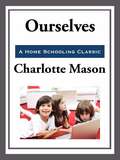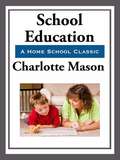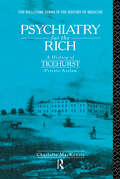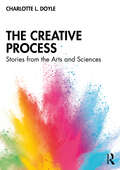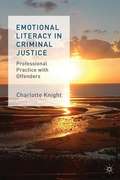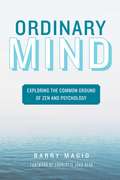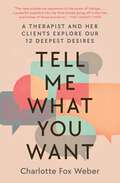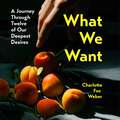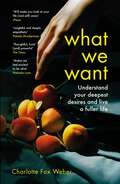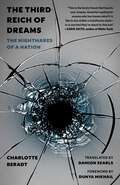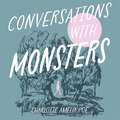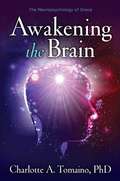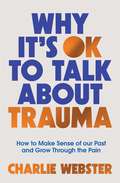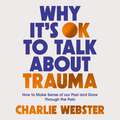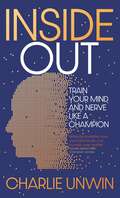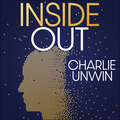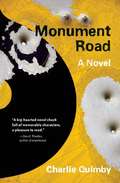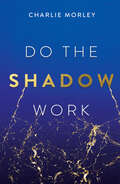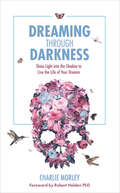- Table View
- List View
Ourselves
by Charlotte MasonOurselves, the fourth volume of Charlotte Mason's Classic Homeschooling Series, is a character curriculum book written directly to children. Book I, Self-Knowledge, is for elementary school students; Book II, Self-Direction, is for older students. Self-Knowledge discusses our human desires and appetites; the "helpers" in our minds, such as intellect, sense of beauty, imagination, and reason; the ways in which we feel and express love for others, including sympathy, kindness, generosity, gratitude, courage, loyalty, and humilty; and truth, justice, and integrity; and ends by encourages children to develop the habit of being useful. Self-Direction is an in-depth discussion of the conscience and virtues such as temperance, chastity, fortitude, and prudence; the will and self-control; and the soul and its capacities, such as prayer, thanksgiving, faith, and praise. Charlotte Mason was a late nineteenth-century British educator whose ideas were far ahead of her time. She believed that children are born persons worthy of respect, rather than blank slates, and that it was better to feed their growing minds with living literature and vital ideas and knowledge, rather than dry facts and knowledge filtered and pre-digested by the teacher. Her method of education, still used by some private schools and many homeschooling families, is gentle and flexible, especially with younger children, and includes first-hand exposure to great and noble ideas through books in each school subject, conveying wonder and arousing curiosity, and through reflection upon great art, music, and poetry; nature observation as the primary means of early science teaching; use of manipulatives and real-life application to understand mathematical concepts and learning to reason, rather than rote memorization and working endless sums; and an emphasis on character and on cultivating and maintaining good personal habits. Schooling is teacher-directed, not child-led, but school time should be short enough to a
School Education
by Charlotte MasonSchool Education, the third volume of Charlotte Mason's Homeschooling Series, consists of thoughts about the teaching and curriculum of children aged 9-12, either at school or at home. She suggests that parents should practice what she calls "masterly inactivity"-not neglectful or permissive parenting, but simply allowing children to work things out for themselves, do things for themselves, learn from their own mistakes, and to have time for free play, and space for spontaneity. Charlotte Mason education uses "living books" instead of dry textbooks; in this book, she discusses what kinds of books to look for in each subject, and how to use them to teach children to love knowledge and become real readers and lifelong learners. Charlotte Mason was a late nineteenth-century British educator whose ideas were far ahead of her time. She believed that children are born persons worthy of respect, rather than blank slates, and that it was better to feed their growing minds with living literature and vital ideas and knowledge, rather than dry facts and knowledge filtered and pre-digested by the teacher. Her method of education, still used by some private schools and many homeschooling families, is gentle and flexible, especially with younger children, and includes first-hand exposure to great and noble ideas through books in each school subject, conveying wonder and arousing curiosity, and through reflection upon great art, music, and poetry; nature observation as the primary means of early science teaching; use of manipulatives and real-life application to understand mathematical concepts and learning to reason, rather than rote memorization and working endless sums; and an emphasis on character and on cultivating and maintaining good personal habits. Schooling is teacher-directed, not child-led, but school time should be short enough to allow students free time to play and to pursue their own worthy interests such as handicrafts.
Psychiatry for the Rich: A History of Ticehurst Private Asylum 1792-1917 (Wellcome Institute Series In The History Ser.)
by Charlotte MacKenzieThe madhouse often figures prominently in popular conceptions of the nineteenth century, yet little is known about the realities of private institutions. In Psychiatry for the Rich, Charlotte MacKenzie examines the history of the asylum at Ticehurst in Sussex to explore the social history of madness and the impact of politics and popular opinion. She details the backgrounds of the patients, their own descriptions of the asylum as well as changes in the institution through the lunacy reforms and developments in medical theory. Challenging many of the accepted views of the Victorian asylum, Money, Medicine and Madness is the most revealing account of the trade in lunacy in the nineteenth century.
The Creative Process: Stories from the Arts and Sciences
by Charlotte L. DoyleThe Creative Process: Stories from the Arts and Sciences asks how celebrated works of art and breakthroughs in science came to be. What was the first inkling? What were the steps and missteps along the way? How was the process experienced by the creative person as it proceeded? And what are the implications for the psychology of the creative process? Each chapter focuses on a specific creative endeavor, situating the work in the context of domain, culture, and historical era. Then it traces the development of the work—from what we know of its beginnings to its fulfillment. Qualitative materials—interviews, notebooks, diaries, sketches, drafts, and other writings—allow a story of the creative process as lived to emerge. The narratives exemplify established concepts in the psychology of creativity, propose broadening some, reveal the need for modification, and suggest new ones. Application of phenomenological frameworks illuminate the episodes in new ways as well. The case study approach proves again that each episode is unique, yet themes and variations come into view when the episodes are considered together in a final reflection. From Darwin’s theory to an unusual jazz sound, here are 11 fascinating stories of how specific works took shape. Psychologists, students interested in creativity, and all those intrigued by the process in any creative field will find this book essential reading.
Emotional Literacy in Criminal Justice
by Charlotte KnightEmotions remain largely invisible in the management of criminal justice practice. This book seeks to uncover some of the underground emotional work of practitioners and make visible the impact of both positive and negative emotions, which play a crucial role in practitioner-offender relationships. Exploring how practitioners understand, regulate and work with emotion, Knight argues that the 'soft skills' of emotion are more likely to achieve motivation and change in offenders than the 'hard' skills of punishment, monitoring and surveillance. The book examines some of the gendered implications of this practice and develops an argument for the explicit building of emotional resources within organizations to sustain the development, enhancement and support of emotional literacy in the workforce. Using practice examples, Knight reveals how practitioners can benefit from having an understanding of their own emotions and how these can impact on their practice. This unique and accessible book will be a valuable resource to practitioners across the criminal justice sector including probation officers, youth justice workers, police and prison officers, social workers, policymakers and managers, as well as scholars working within criminology, criminal justice and probation.
Ordinary Mind
by Charlotte Joko Beck Barry MagidIs meditation an escape from--or a solution to--our psychological problems? Is the use of antidepressants counter to spiritual practice? Does a psychological approach to meditation reduce spirituality to "self-help"? What can Zen and psychoanalysis teach us about the problems of the mind and suffering? Psychiatrist and Zen teacher Barry Magid is uniquely qualified to answer questions like these. Written in an engaging and witty style, Ordinary Mind helps us understand challenging ideas--like Zen Buddhism's concepts of oneness, emptiness, and enlightenment--and how they make sense, not only within psychoanalytic conceptions of mind, but in the realities of our lives and relationships. This new paper edition of Magid's much-praised book contains additional case study vignettes.
Multilingualism
by Anat Stavans Charlotte HoffmannHow do children and adults become multilingual? How do they use their languages? What influence does being multilingual have on their identities? What is the social impact of multilingualism today and how do societies accommodate it? These are among the fascinating questions examined by this book. Exploring multilingualism in individuals and in society at large, Stavans and Hoffmann argue that it evolves not from one factor in particular, but from a vast range of environmental and personal influences and circumstances: from migration to globalisation, from the spread of English to a revived interest in minority languages, from social mobility to intermarriage. The book shows the important role of education in helping to promote or maintain pupils' multilingual language competence and multilingual literacy, and in helping to challenge traditional monolingual attitudes. A clear and incisive account of this growing phenomenon, it is essential reading for students, teachers and policy-makers alike.
Tell Me What You Want: A Therapist and Her Clients Explore Our 12 Deepest Desires
by Charlotte Fox WeberFor fans of Maybe You Should Talk to Someone and Tiny Beautiful Things, this inspiring and moving exploration of the twelve fundamental psychological needs we all share goes behind the closed doors of therapy to guide us in navigating our deepest longings.What do we want? And how do we get it? Chloe is beautiful and fiercely bright, but she feels desperately deprived. Elliot, lost and adrift, is secretly grieving the loss of his famous lover. Rosie has always tried to follow the rules of cultural expectations, but a year into her marriage, she still hasn&’t had sex with her husband. Dwight is determined to be upbeat, even in the face of his wife&’s betrayal. Each of us, at certain moments in our lives, can feel lost or confused. We often don&’t know how to get what we want, or what we think we want, but we share these universal desires: to love and be loved; understanding, power, attention, freedom; to create, to belong, to win, to connect, to control; and we want what we shouldn&’t. In each of these twelve chapters, focused on one of these universal desires, psychotherapist Charlotte Fox Weber takes you behind the closed doors of a therapy session to bear witness as she guides a client towards profound insights, change, and growth. Written with warmth and compassion, full of dramatic, intimate, and moving personal stories, and based on careful research as well as firsthand observations, Tell Me What You Want is an inspirational guide to living well.
What We Want: A Journey Through Twelve of Our Deepest Desires
by Charlotte Fox WeberChloe is beautiful and fiercely bright, but her thirst for booze and attention is insatiable.Sara resents being tied down to anything, but part of her craves stability.Elliot is secretly grieving the death of his famous lover and feels like he's invisible.The lives and problems of psychotherapist Charlotte Fox Weber's clients vary, but all are united by a common question: what do I really want?In What We Want, Charlotte Fox Weber takes us on a journey through twelve universal wants and desires, bringing us behind the closed doors of her practice. It is at once a fly-on-the-wall look at what binds us all, an expression of the profound importance of understanding and articulating our desires, and a practical toolkit for living well.(P) 2022 Headline Publishing Group Ltd
What We Want: A Journey Through Twelve of Our Deepest Desires
by Charlotte Fox Weber'Thoughtful, lucid and blessedly free of therapese . . . Weber's book is a powerful snapshot into the little bombs going off in the lives and homes of those around us' SUNDAY TIMES'Finely crafted, profound and always generous . . . Made me feel excited to be alive' NATASHA LUNNOur secret wants and desires are often hidden in a box. But what happens when you lift the lid? Chloe is beautiful and fiercely bright, but her thirst for alcohol and attention is insatiable.Sara resents being tied down to anything, but part of her craves stability.Elliot is secretly grieving the death of his famous lover and feels like he's invisible.The lives and problems of psychotherapist Charlotte Fox Weber's clients vary, but all are united by a common question: what do I really want?In What We Want, Charlotte Fox Weber takes us on a journey through twelve universal wants and desires - love, power, sex, attention, and more - bringing us behind the closed doors of her practice. As she gently guides her clients towards a deeper understanding of themselves, she invites them - and us - to find a fuller way of living.What We Want is at once a fly-on-the-wall look at what binds us all, an expression of the profound importance of understanding and articulating our desires, and a practical toolkit for living well.More Love for What We Want:'Insightful and deeply empathetic . . . Offers hope that we can actually get better' PAMELA DRUCKERMAN'Will surely convince even the most sceptical critic that effective counselling can truly transform lives' CHRISTIE TATE
Finding Joy: 101 Ways to Free Your Spirit and Dance with Life
by Charlotte Davis KaslFrom the book jacket: In Finding Joy, Charlotte Davis Kasl offers her readers an insightful, spiritual, yet light-hearted guide for bringing perspective and balance to life. She takes us on a path to joy that includes playfulness, creativity, honesty, and self-acceptance. Instead of being immersed in life's dramas, she helps us dance lightly with them, bringing a sense of fascination to our lives as they unfold. Through a wealth of creative and playful strategies she helps us release fear, self-criticism, buried feelings, and shame, and accept ups and downs as a natural part of life. From this perspective we are able to relax and be open to solutions and alternatives that seldom come when we are tense, serious, or immersed in blame. She also shows how the positive power of joy can help us bridge differences between groups of people, help us find our common bonds and lead to a more peaceful world. This positive, realistic book helps the reader tap into the wonder and wisdom within us and around us. Whether we are struggling with depression, coping with everyday difficulties, or simply wanting more joy, this is a welcome guide to help us free our spirits and dance with life.
Women, Sex, and Addiction: A Search for Love and Power
by Charlotte Davis KaslFor most women, sexually addictive and sexually co-dependent behavior are intertwined. Sexually co-dependent behavior reflects basic female conditioning in our society - we are taught that a woman's power is in her sexuality, yet her sexuality is often controlled by men. Thus, sex can easily become a basic form of barter: it is the price many women pay for love and the illusion of security. The addicted woman, seeking a sense of personal power and an escape from pain, may use sex and romance as a high or as a way to feel in control, just as an alcoholic uses alcohol. Either way, however, sex never'satisfies her longing for love and self-worth. Combining remarkably candid case histories with provocative cultural analyses, Dr. Charlotte Kasl dramatically evokes both the experience of addiction and the process of recovery. She illuminates the insidious relationship between adult addiction and early abuse or neglect and explores the connections between all forms of addiction. Her guide to recovery is backed by a life-affirming discussion of healthy love and spiritual awareness. With this wise, compassionate book, women will learn to experience their sexuality as a source of love and positive power, and sex as an expression that honors the soul as well as the body.
The Third Reich of Dreams: The Nightmares of a Nation
by Charlotte BeradtThe hidden history of a nation sleepwalking its way into evilCharlotte Beradt began having unsettling dreams after Adolf Hitler took power in 1933. She envisioned herself being shot at, tortured and scalped, surrounded by Nazis in disguise, and breathlessly fleeing across fields with storm troopers at her heels. Shaken by these nightmares and banned as a Jew from working, she began secretly collecting dreams from her friends and neighbors, both Jewish and non-Jewish. Disguising these &“diaries of the night&” in code and concealing them in the spines of books from her extensive library, she smuggled them out of the country one by one.Available again for the first time since its publication in the 1960s, this sensational book brings together this uniquely powerful dream record, offering a visceral understanding of how terror is internalized and how propaganda colonizes the imagination. After Beradt herself fled Germany for New York, she collected these dream accounts and began to trace the common symbols and themes that appeared in the collective unconscious of a traumatized nation. The fear of dictatorship was ever-present. Dreams of thought control, even the prohibition of dreaming itself, bore witness to the collapse of outer and inner worlds.Now in a haunting new translation by Damion Searls and with an incisive foreword by Dunya Mikhail, The Third Reich of Dreams provides a raw, unfiltered, and prophetic look inside the experience of living through Hitler&’s terror.
Conversations with Monsters: On Mortality, Creativity, And Neurodivergent Survival
by Charlotte Amelia PoeHow does autistic trauma really feel, and how can you find your way through it to a warmer, brighter place?Written by best-selling author Charlotte Amelia Poe this is a poignant and whimsical exploration of the true autistic experience. Chapter-by-chapter, Poe delicately peels back the layers of what it is to be young and autistic in the modern world, touching on trauma, grief, mortality, love and everything in between.Charming, thought-provoking and often very funny, this book doesn't offer solutions - it walks next to you, like a friend, through times both dark and light. It reminds you every step that you're not alone.
Awakening the Brain: The Neuropsychology of Grace
by Charlotte A. TomainoHuman potential cannot be quantified. The more we learn about the brain, the more hidden promise we unearth. What if you could harness the full spectrum of your abilities by engaging your brain in such a way to expand your awareness and broaden your skill sets? Through simple exercises and insights, you can increase your capacity to learn and fundamentally change the way your brain functions. In Awakening the Brain, Dr. Charlotte A. Tomaino reveals how the way you think and what you believe can actually awaken your brain and expand your consciousness. You'll learn how to: * read your Brain-Body Compass to make positive choices; * alleviate stress to keep your brain in its optimal arousal state; * focus your mind to guide your thoughts and emotions; * connect with the inherent strength of your intuition; and * engage the full power of your thoughts and beliefs. Microsoft Tags throughout the book link to free explanatory videos for those who want more information. Wake up to your true potential!
Awakening the Brain
by Charlotte A TomainoHuman potential cannot be quantified. The more we learn about the brain, the more hidden promise we unearth. What if you could harness the full spectrum of your abilities by engaging your brain in such a way to expand your awareness and broaden your skill sets? Through simple exercises and insights, you can increase your capacity to learn and fundamentally change the way your brain functions. In Awakening the Brain, Dr. Charlotte A. Tomaino reveals how the way you think and what you believe can actually awaken your brain and expand your consciousness. You'll learn how to: * read your Brain-Body Compass to make positive choices; * alleviate stress to keep your brain in its optimal arousal state; * focus your mind to guide your thoughts and emotions; * connect with the inherent strength of your intuition; and * engage the full power of your thoughts and beliefs. Microsoft Tags throughout the book link to free explanatory videos for those who want more information. Wake up to your true potential!lains the basic workings of the brain in direct, simple language. No science classes required. In addition, Microsoft tags throughout the book link to free explanatory videos to enhance the experience for those who want more.he way our consciousness interprets our experience How ancient spiritual practices have been shown to affect the brain How you can train the neural networks in you brain to create a shift in your own consciousness How enlightenment is literally a physical state of mind How you can design and build your own divine mind and achieve a life of spiritual connection To further enhance the reading experience, Microsoft tags appear throughout the text, which link you to videos that dig even deeper into this fascinating subject.
Why It's OK to Talk About Trauma: How to Make Sense of the Past and Grow Through the Pain
by Charlie WebsterTHIS IS THE BOOK YOUR BRAIN, BODY AND FUTURE SELF NEED TO READ.More than half of us will have experienced some kind of trauma in our lives - many of us multiple times over. But most of us ignore or avoid our traumatic experiences, and struggle alone in the emotional pain that remains. In Why It's OK to Talk About Trauma, award-winning journalist and campaigner Charlie Webster explores what trauma is, how trauma impacts us mentally, emotionally and physically, and why our past experiences influence our day-to-day behaviours. She draws on her own story, research and insight, backed by the clinical psychologist that treated her.'I wrote this book following my journey through trauma recovery. I've included everything I've learnt in the hope that it will also help you. I want to show you that it is okay to talk about trauma, but I know it's not easy. Sometimes it's hard to admit that what has happened to us affects us so deeply. But by the time you turn the final page, my intention is that you will feel different; what has happened will not have disappeared but it will feel more manageable and you will be equipped to deal with trauma and life moving forward.Whatever has happened to you, we can face it together in this book. I am with you on this journey.'
Why It's OK to Talk About Trauma: How to Make Sense of the Past and Grow Through the Pain
by Charlie WebsterWhy It's OK to Talk About Trauma is the book your brain, body and future self need to read. 1 in 2 people experience trauma at some point in their lives. Trauma can be a result of anything which causes fear, helplessness and horror.Broadcaster and abuse survivor Charlie Webster uses her own lived experience alongside advice from experts to create a companion for trauma survivors – a book that will help, explain, understand and navigate the impact of trauma on our lives.As someone who has experienced multiple traumas, Charlie has written the book she longed for when she was working through her traumatic past. She shares her story whilst providing insight, support and tools to help trauma sufferers and their loved ones.
Why It's OK to Talk About Trauma: How to Make Sense of the Past and Grow Through the Pain
by Charlie WebsterTHIS IS THE BOOK YOUR BRAIN, BODY AND FUTURE SELF NEED TO READ.More than half of us will have experienced some kind of trauma in our lives - many of us multiple times over. But most of us ignore or avoid our traumatic experiences, and struggle alone in the emotional pain that remains. In Why It's OK to Talk About Trauma, award-winning journalist and campaigner Charlie Webster explores what trauma is, how trauma impacts us mentally, emotionally and physically, and why our past experiences influence our day-to-day behaviours. She draws on her own story, research and insight, backed by the clinical psychologist that treated her.'I wrote this book following my journey through trauma recovery. I've included everything I've learnt in the hope that it will also help you. I want to show you that it is okay to talk about trauma, but I know it's not easy. Sometimes it's hard to admit that what has happened to us affects us so deeply. But by the time you turn the final page, my intention is that you will feel different; what has happened will not have disappeared but it will feel more manageable and you will be equipped to deal with trauma and life moving forward.Whatever has happened to you, we can face it together in this book. I am with you on this journey.'
Inside Out: Train your mind and your nerve like a champion
by Charlie Unwin"Brilliantly illustrates how your mind really can triumph over matter." Frankie Dettori MBE, Champion JockeyIn any high-pressure environment, from special operations to the operating theatre, you can divide people into two groups - those whose performance is controlled from the outside in and those who control their performance from the inside out.Inside Out is about your ability to achieve incredible things on the outside by paying attention to what's on the inside. In his first ever book, Charlie Unwin shares unparalleled insight into the minds and inner workings of the world's most accomplished performers, including double Olympic champions, special forces soldiers, fighter pilots, surgeons, barristers, chefs, musicians and financial traders.Combining his unique experience as a performance psychologist with a blend of cutting-edge science and conventional wisdom, Charlie takes you on a journey through the three dimensions that shape your inner world - the Thinking Dimension, the Feeling Dimension and the Intuitive Dimension.In doing so, he turns the complexities of neuroscience, stress adaptation and cognitive performance into simple and effective training principles that you can use in your everyday quest for excellence. Inside Out will give you the confidence to do more and go further with what you already have."Anyone interested in exploring their own performance potential is going to benefit immensely from this book." DS, former SAS Squadron Commander
Inside Out: Train your mind and your nerve like a champion
by Charlie Unwin"Brilliantly illustrates how your mind really can triumph over matter." Frankie Dettori MBE, Champion JockeyDiscover the techniques that enable elite performers to perform at their best under immense pressure.In any high-pressure environment, from special operations to the operating theatre, you can divide people into two groups - those whose performance is controlled from the outside in and those who control their performance from the inside out.Inside Out is about your ability to achieve incredible things on the outside by paying attention to what's on the inside. In his first ever audiobook, Charlie Unwin shares unparalleled insight into the minds and inner workings of the world's most accomplished performers, including double Olympic champions, special forces soldiers, fighter pilots, surgeons, barristers, chefs, musicians and financial traders.Combining his unique experience as a performance psychologist with a blend of cutting-edge science and conventional wisdom, Charlie takes you on a journey through the three dimensions that shape your inner world - the Thinking Dimension, the Feeling Dimension and the Intuitive Dimension.In doing so, he turns the complexities of neuroscience, stress adaptation and cognitive performance into simple and effective training principles that you can use in your everyday quest for excellence. Inside Out will give you the confidence to do more and go further with what you already have."Anyone interested in exploring their own performance potential is going to benefit immensely from this book." DS, former SAS Squadron Commander(P) 2022 Hodder & Stoughton Limited
Inside Out: Train your mind and your nerve like a champion
by Charlie Unwin"Brilliantly illustrates how your mind really can triumph over matter." Frankie Dettori MBE, Champion JockeyIn any high-pressure environment, from special operations to the operating theatre, you can divide people into two groups - those whose performance is controlled from the outside in and those who control their performance from the inside out.Inside Out is about your ability to achieve incredible things on the outside by paying attention to what's on the inside. In his first ever book, Charlie Unwin shares unparalleled insight into the minds and inner workings of the world's most accomplished performers, including double Olympic champions, special forces soldiers, fighter pilots, surgeons, barristers, chefs, musicians and financial traders.Combining his unique experience as a performance psychologist with a blend of cutting-edge science and conventional wisdom, Charlie takes you on a journey through the three dimensions that shape your inner world - the Thinking Dimension, the Feeling Dimension and the Intuitive Dimension.In doing so, he turns the complexities of neuroscience, stress adaptation and cognitive performance into simple and effective training principles that you can use in your everyday quest for excellence. Inside Out will give you the confidence to do more and go further with what you already have."Anyone interested in exploring their own performance potential is going to benefit immensely from this book." DS, former SAS Squadron Commander
Monument Road
by Charlie QuimbyLeonard Self has spent a year unwinding his ranch, paying down debts, and fending off the darkening. Just one thing left: taking his wife's ashes to her favorite overlook, where he plans to step off the cliff with her into a stark and beautiful landscape. But Leonard finds he has company on a route that intertwines old wounds and new insights that make him question whether his life is over after all."Part modern western, part mystery, this first novel will appeal to fans of Louise Erdrich and Kent Haruf. Quimby's prose reads so true, it breaks the heart."-BOOKLIST, starred review"The Colorado setting and the author's simple style of prose perfectly complement the complexity of the human spirit in this superb debut."-PUBLISHERS WEEKLY"Monument Road is so rich with landscape, character and event that such a small telling cannot begin to do it justice. Read this exquisite story; it is a joy and a wonder and a tour de force of authorship."-SHELF AWARENESS"Quimby's storytelling, his humane impulses and his lyrical passages on the meaning of love and time, and on the history, geology and botany of the region, will surely impress readers."-MINNEAPOLIS STAR TRIBUNE"Quimby uses words as spare as Colorado's landscape to describe characters who range from endearing to crusty, wise to foolish, spiritual to downright evil. The folks who live near Monument Road aren't just descriptions in a book; they're complex people readers will care about."--FOREWORD REVIEWS"Not to be overlooked is the love, humor and friendship among pain and loss, which makes it a book far more about the richness of life than the finality of death."-GRAND JUNCTION DAILY SENTINEL"Monument Road is a wonderful novel full of wit and wisdom, generosity and malice."-GRAND JUNCTION FREE PRESS"Quimby's writing is sensitive and graceful; he has a talent for revealing slowly blossoming characters who are beautifully flawed and realistic."-THE DESERET NEWS"While not exactly a happy novel, Monument Road is beautiful and real, full of landscape imagery of the American Southwest as a poignant and sometimes haunting metaphor of our connections to the land."-15 BYTES"This is a novel with size and scope and generosity, with an acute understanding of human nature and a deep appreciation for the ways people face change and work out their lives in relation to each other."-Kent Meyers, author of Twisted Tree and The Work of Wolves"In prose that might have been chiseled from the magnificent landscape he describes, Charlie Quimby has written a great big American Novel. Full of pathos and humor and sadness, you won't reach the end of this book without feeling fuller and wiser. What a gift Charlie has given us."-Peter Geye, author of The Lighthouse Road and Safe from the Sea"Monument Road is a legitimate modern western, complete with an impressively authentic and aging rancher, heartache, ghosts, low-lifes, a rural landscape undergoing radical transformation, a glut of evangelical churches, and the ancient, powerful cliffs and mesas that surround it all, in southwestern Colorado. The narrative is likewise unpredictable and wild! A pleasure to read."-Bonnie Nadzam, author of Lamb"The landscape and characters of Monument Road ring true. Charlie Quimby has created a story that is hard to forget. His attention to the details of a fading life and life style are spot on and will be a window to any reader's understanding of the central phenomenon of the New West."-Dan O'Brien, author of Stolen Horses and Buffalo for the Broken Heart: Restoring Life to a Black Hills Ranch"Monument Road is a big-hearted novel chock full of memorable characters, a pleasure to read."-David Rhodes, author of Jewelweed and Driftless
Do the Shadow Work: And Find Lasting Self-Love and Acceptance
by Charlie MorleyDiscover what shadow work really is and how to reclaim and integrate your shadow self for healing and transformation.Your shadow is made up of everything you hide from the world: your fears, your shame and your wounds, but also your untapped brilliance, unexpressed talents and potential. By learning to embrace and integrate these hidden aspects of yourself, you can unlock profound healing, self-awareness and personal power.With over 20 practices that blend ancient wisdom and modern psychology, this transformative guide will help you:Recognize the shadow and how you create and project itFind and express the golden or &‘positive&’ shadow selfTransform fear and shame into loving awareness, energy and powerIntegrate the parental, sexual, ancestral and childhood shadows.This book will take you on a life-changing and healing journey of self-acceptance. It&’s time to stop running from your shadow and start befriending it. It&’s time to do the shadow work.Part of this book was previously published as Dreaming Through Darkness (ISBN: 9781781807354).
Dreaming through Darkness: Shine Light into the Shadow to Live the Life of Your Dreams
by Charlie MorleyThe Shadow is the part of us made up of all that we hide from others: our shame, our fears and our wounds, but also our divine spirit, our blinding beauty and our hidden talents. The Shadow is not bad – in fact it is the source of our creativity and power – but until we bring it into the light this power will remain untapped and our full potential unreached. Using practical exercises sourced from lucid dreaming and dream-work, Tibetan Buddhism and mindfulness meditation, this book explores how to:• Transform the dark and light shadow side• Meet the shadow through your dreams• Unlock your creativity• Transform Nightmares through lucid dreaming• Manifest your hidden potential• Make friends with fear & anxiety• Decrease stress through Mindfulness of Dream & SleepThis book will show you how to fearlessly embrace your shadow side in both your dreams and daily life, thereby manifesting the awakened power of your full potential.
